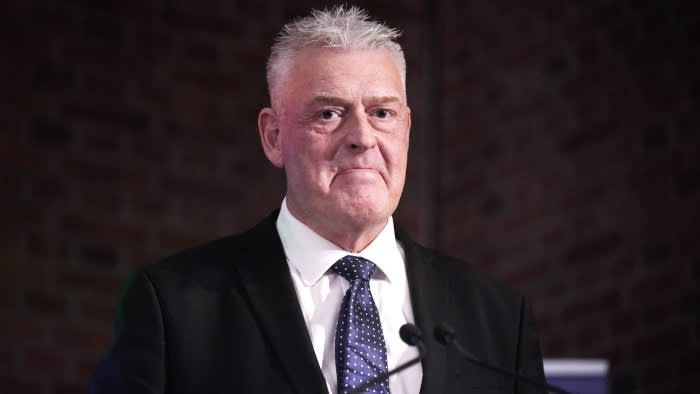UK deputy PM declines to say if Lee Anderson comments over Sadiq Khan were racist

Access the Editor's Digest without any cost
Every week, Roula Khalaf, the FT Editor, picks her preferred stories for this newsletter.
The deputy prime minister of Britain did not answer whether the remarks made by Lee Anderson, a former senior Tory member, regarding the London mayor Sadiq Khan were discriminatory. On the other hand, Rishi Sunak cautioned that the democracy shouldn't get divided into opposing groups following a distressing week at the parliament.
In simpler terms, Oliver Dowden expressed that the comments made by MP for Ashfield about Islamists having control over London and its Labour mayor could be considered as Islamophobic. However, he also believed that the MP did not intentionally make those remarks with the aim of being Islamophobic.
Anderson, who was once the deputy chair of the Conservative party, faced suspension on Saturday for making controversial comments during an interview with the television channel GB News. According to reports, he had claimed that Khan had unfairly favored his friends by handing over control of the city to them.
Anderson stated that he understands that Simon Hart and Sunak had to suspend the whip in these circumstances, and he accepts it.
When questioned about whether Anderson could have stayed in the party had he apologized for his remarks, Dowden stated that he would have been allowed to do so.
The assistant leader of the government expressed his worry for the harmful declarations aimed at Members of Parliament, frequently linked to Islamic militants. He emphasized that it is crucial to confront this issue rather than refrain from acknowledging it.
Dowden spoke out following the prime minister's condemnation of a growing trend of harassment in the aftermath of the disorderly House of Commons vote on the Gaza ceasefire on Wednesday.
Sunak made his initial foray into the discussion centered on how the pro-Palestinian demonstrations are affecting the UK political scene. On Saturday, he expressed that "our political system should not yield to the menace of violence and coercion or divide into polarizing factions who loathe one another."
He mentioned in a statement that the happenings of the last few weeks depict a recurrent behavior that should not be acceptable. He referred to the fact that certain individuals with extremist agendas have taken over otherwise lawful demonstrations to advocate and exalt terrorism. Additionally, elected officials have been subject to verbal abuse and physical assaults.
Members of Parliament (MPs) have become more vocal about their apprehension regarding their safety and protection. A considerable number of them disclosed that they have encountered threats of physical aggression because of their stance regarding the Israeli military's offensive in Gaza.
The House of Commons speaker, Sir Lindsay Hoyle, stated that he was worried about some issues, which led him to alter the voting protocols. This modification ensured that they could hold a vote on Wednesday regarding a Labour proposal in response to a Scottish National party motion that urged for a ceasefire.
The decision caused disordered and turbulent events in the House of Commons. The Conservative party declined to vote, and numerous Members of Parliament left. Over 70 parliamentarians have presently signed an initial motion indicating their lack of faith in Hoyle.
The speaker's status remains uncertain at present. In the upcoming week, the SNP may demand another important discussion regarding a ceasefire in Gaza. This action could potentially force Hoyle to deviate from past practices and cause further friction.
Last Sunday, Sir Keir Starmer, leader of the Labour party, got involved in the Anderson controversy. He criticized Sunak, stating that he has "extremists in his party" and is permitting Tory MPs to behave recklessly without consequence.
Starmer criticized the prime minister's decision to appoint Lee Anderson as his party's deputy chair, citing Anderson's recent comments on GB News as a derogatory and discriminatory attack on both racial and religious grounds.
A request for comment was made to Downing Street.
Nigel Farage, the leader of Reform UK, has requested Anderson's involvement in his conservative political party, which has led to rumors of Anderson potentially leaving the current political party they are affiliated with as an independent MP.
Last year, Sunak selected Anderson as the deputy chairperson for the Conservative Party in hopes of gaining more support in areas of Northern England that traditionally vote for Labour, commonly known as the "red wall." However, Anderson recently resigned from the position because he believed that the government's approach to migration policy in Rwanda was not strong enough.
Several Conservative Members of Parliament who belong to the One Nation group, which sits towards the political center, are concerned that the party's adoption of right-wing views and anti-immigrant language will have a negative impact and could result in a loss of support during the upcoming election. This strike to be especially true in affluent regions in the southern part of England that have more liberal-leaning tendencies.































































